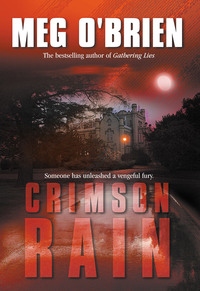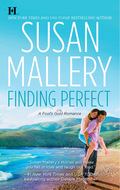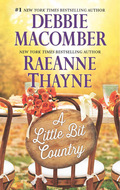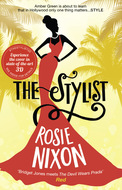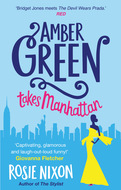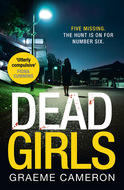Kitap dosya olarak indirilemez ancak uygulamamız üzerinden veya online olarak web sitemizden okunabilir.
Kitabı oku: «Crimson Rain», sayfa 2
He couldn’t help himself. Reaching over, he slid a hand inside the bra and cupped one of her breasts. Stepping closer, he pulled her to him, closing his eyes and resting his chin on her head. “Oh, God, you feel so good.”
Despite himself, he began to grow hard again. He glanced at the little clock decorated with hand-painted cherubs on the night table, one of the few things Lacey had brought with her from her own apartment. She hadn’t owned much, having just moved to Seattle in the summer. When he’d offered to help her pack to come here, she had said, “I don’t have enough to bother with. I think I’ll just put most of it in storage.” It had made him feel good to be able to give her a better life than she’d had in Atlanta, growing up in a home where her hardworking parents could never quite make ends meet.
It was ten forty-five, according to the clock. He calculated quickly. It would take him twenty minutes at the most to drive home, and if he left here by eleven-thirty he could be there before midnight. That gave him another forty-five minutes.
He pulled Lacey down on the bed, his tongue seeking hers, his body working quickly against her, the bra and bikini panties slipping off easily as he molded himself to her skin.
When the phone rang again, Gina thought it was Paul. Gina muted the sound of the television and picked up the cordless phone by the bed.
“Hi, Mom.” Rachel’s high, young voice came over the wires.
“Honey?” Gina sat straighter as alarm bells went off. “Why are you calling so late? Is something wrong?”
“No…just nervous, I guess. Flying, you know.”
Gina went into automatic mother mode. “Well, but think how many times you’ve done it, and you’ve always arrived safe and sound! I’m sure you’ll be fine.”
She couldn’t let Rachel know how anxious she herself always felt when her daughter was in the air.
“I made reservations for dinner at the Space Needle,” she said. “You can look forward to that, at least.”
Rachel’s smile seemed to carry through the phone. “Great! I’ll get my first solid meal in days and a view of Seattle, too. Is, uh—is Dad coming?”
“Of course he is. He wouldn’t miss picking you up with me. He never has, has he?”
“No. I just thought…he’s pretty busy lately, isn’t he? I haven’t had many e-mails from him in the past few weeks.”
“Well, you know how busy your father always is at this time of year.”
“Sure, I guess that’s it. Hey, Mom? I really need to shop for some clothes. Do you mind?”
“Of course not. We’ll go on Saturday.”
“There’ll be Christmas crowds, though.”
“I’ll fend them off the same way I did last year,” Gina said, smiling. “They won’t stand a chance.”
She had expected Rachel to laugh, but all she said was, “Mom, really,” in a tone that sounded like disgust.
Last year, while cleaning off the front steps, Gina had slipped on a patch of ice, spraining her ankle. When she and Rachel had gone shopping, she was recovering but still used a cane. Much to her delight, she discovered that the crowds in the stores had parted for her as if she were Moses parting the Red Sea. She had thought Rachel had enjoyed that, too, but now she wondered if her daughter had been embarrassed by her.
“I, uh…I could wrap an Ace bandage around my ankle, if that would make you feel better,” she tried with a hint of humor. “No one would ever guess there was nothing wrong with me.”
Rachel’s voice took on an edge. “For heaven’s sake, who are you, my mom’s evil twin? Watch out, or we might have to cart you away—”
She bit the words off, as if suddenly realizing what she’d said. Not before her remark had shocked Gina, however. Rachel was always so careful not to talk about her twin, or say anything that might even remind Gina of her.
“Sorry, Mom,” Rachel said softly.
“Oh, honey, it’s all right. I know you didn’t mean anything by it.”
But was that true? she wondered. They had never really known how much Rachel had suffered over the loss of her sister. She was too silent, keeping too much inside. Not even Victoria had been able to bring much out. The best Gina and Paul could do was provide Rachel with all the love they had to give. And, of course, reassure her that what had happened to Angela would never happen to her.
Gina talked with her daughter a few minutes more, and then said goodbye. As she turned off her reading light, she pulled the down comforter up over her shoulders, feeling a chill. It was bad enough that Paul withdrew every year at this time. What if Rachel began to do that, too?
As Paul drove home, he automatically began the mental transition from Lacey’s chrome-and-glass apartment to the elegant house on Queen Anne Hill. Often he would relax by listening to classical music on a CD, but tonight, as he drove past homes decorated to the hilt with Christmas lights, the usual holiday depression set in. He couldn’t keep himself from wondering how things had turned out this way, after such great hopes for the future. Hadn’t he started out life with all the usual excitement of a college graduate with an MBA? And hadn’t he thought, like most, that he had the world by the tail?
Even meeting Gina had required little effort. They’d run into each other in a campus café during their last year at the University of Washington, begun dating and were married shortly after graduation. They wrote down their goals for themselves and their marriage on crisp white paper, and mapped out their lives in the way of young couples in the eighties: Gina would work for a while until Paul became established and they had a nice nest egg. Then she would quit to stay home and raise children. They would have two children—a good number in an age where having too many was frowned upon as not being politic, in a world where populations had exploded and having big families was an environmental no-no.
They wouldn’t get bogged down in work for work’s sake, they agreed, the way their parents had. Having been born in the sixties, they remembered fathers who wore business suits and ties, fathers with gray faces who trudged back and forth to the office every day and kept their noses to the grindstone to buy a house with a mortgage that wouldn’t be paid off until long after they were dead. They remembered mothers who from the age of eighteen had stayed home and been housewives, who had so many children to raise they’d become more and more worn-out as the years went by, their dreams turned to so much dust.
Paul and Gina swore they would never end up like that. Life in the eighties was going to be different. These were the Reagan years, the years of renewal, a good economy, the years when he who had the most toys won. Paul and Gina would have well-paid jobs that would give them time off to travel through Europe, take vacations, go skiing at Aspen. When Gina finally did leave her job, it would be only after they had a solid nest egg. And she wouldn’t take off forever, the way her mother had. She’d get the children to a certain age and then reenter the work force while she was still employable and could command an excellent salary.
As the first months of their marriage passed, however, Paul and Gina’s Life Plan had taken sharp, unexpected turns. Gina learned she was infertile—a congenital defect, the doctors said. As for Paul, though his antique business brought in the kind of money they’d dreamed about—enough, along with Gina’s work as an interior designer, to enable them to buy the house on Queen Anne Hill—their work took up so much time that he and his wife barely knew each other six months after the honeymoon. They had the house of their dreams but rarely lived in it, except to sleep after the long commute home each night. They had the prerequisite two cars, but traveled in them only to work and back on bogged-down freeways.
After eight months of this, Gina began to have an itch. She wanted a baby. She didn’t want to wait. They had enough money to take care of a child, and she needed more in her life than just work.
So they adopted the girls, a move that was supposed to change their lives. And it did. The hell of it was, it had changed a dream into a deadly nightmare—one from which, Paul knew, he would never awaken, as long as he lived. Was it any wonder he couldn’t fully live in that world—couldn’t participate in a place of so many dark memories, without some kind of light shining through?
Every day he thanked God for Lacey, who had brought him light, as well as laughter. Without her, he would never have survived. In fact, there were moments when he felt she was all that kept him alive.
2
Gina buttered a piece of toast, put it on a plate and slid it across the black granite breakfast bar to Rachel, who gobbled it down as if she hadn’t had a decent meal in weeks.
Which she apparently hadn’t, except for last night at the Space Needle. Gina studied her with a worried frown. Rachel had clearly lost several pounds since summer vacation. She had never been overweight, but was blessed with a trim, athletic figure that was largely from all her years of rowing. Rachel had been a rowing fanatic, latching onto the sport in her first year of high school. Gina and Paul had thought she would go to the University of Washington on a scholarship, but Rachel had surprised them in her senior year by stating that she was no longer interested in rowing, and wanted to go to college in a warmer climate. She had chosen Berkeley, in Northern California. Gina had thought at the time that her daughter simply wanted to spread her wings, put some distance between herself and home. And she had to admit, the change would probably do Rachel good.
Now, however, Gina wasn’t so sure. Sitting there on the stool, with her long brown hair pulled back in a ponytail and no makeup on, Rachel looked much as she had in grade school. Gina remembered how they would sit this way in the mornings, the two of them chatting companionably till Rachel’s ride arrived. Her eyes would light up at the idea of going to a movie on the weekend, or planting spring bulbs with her mother, the two of them digging in the moist earth side by side, no words needed between them.
Where had that easy companionship gone? Rachel had come home this time seeming sullen. Detached. Gina felt the loss like a shaft through her heart.
“Rachel, what’s wrong?” she said now. “You’ve changed somehow since summer.”
“And?”
“And I’m not sure I like all of it. Last night, at the airport, for instance—”
“Oh, for heaven’s sake, I was just tired. I didn’t mean to snap. And why didn’t Dad come? You said he was going to.”
“I thought he was. But I told you, honey, something came up.” Gina ran her fingers through her short-cropped brown hair, inadvertently messing up the style she’d worked at so carefully this morning.
“Came up? At Soleil?” Rachel rolled her eyes.
“Yes, at Soleil,” Gina said, annoyed. “Where else?”
Rachel shrugged and studied her toast, picking off tiny pieces and putting them in her mouth one at a time, chewing slowly. “Nowhere, I guess.”
Gina sighed. So far, this visit was not going at all well. “Rachel, if you’ve got something to say, please just say it.”
Her daughter slid off the stool and took her plate and coffee cup to the sink, grinding the rest of her toast in the disposal. With her back to Gina she said, “I just think there’s something wrong.”
“Like what?”
“I don’t know…like maybe Dad is sick, or something.”
“Is that what you think? That he’s sick?”
Rachel came back and slid onto the stool. Her eyes held a glint of anger. “Well, he’s not acting at all like himself. Haven’t you even noticed?”
“No, I haven’t.” Gina’s brow furrowed. “What would make you say that?”
Rachel shrugged again. “For one thing, he hasn’t been e-mailing me hardly at all this semester. One of my friends at school found out her father had cancer, and the only way she knew was that he stopped talking to her on the phone. He was too sick to call the way he always did.”
“Well, sweetheart, I can assure you that your father does not have cancer. He’s perfectly well, and when he gets down here you can ask him for yourself.”
“That’s another thing. Why is he sleeping so late?”
Gina gritted her teeth. This was worse than when her daughter was seven and asked so many questions that it drove her crazy, especially in the morning before she’d fully woken up.
“It’s only ten o’clock,” she said briskly, looking at her watch. “And speaking of time, we should be leaving soon if we want to beat at least some of the crowds.” She piled her coffee cup and silverware on top of her toast plate.
“Mom, you aren’t—”
“No, I’m not taking the blasted cane!” Gina took her dishes to the sink. “Now stop annoying me, Rachel, and go get dressed. Maybe you’ll meet your father on the stairs, and you can pester him for a while.”
She tempered her words with a smile and crossed over to her daughter, kissing her lightly on the cheek. Rachel gave her a half smile and slipped away, her ponytail bobbing behind her as she went through the door. A scene from childhood, Gina thought. Yet it’s not. It’s all wrong today.
Rinsing the dishes and putting them in the dishwasher, Gina gazed out on the back lawn. The skies over Seattle could be gray in winter, but the rain at least kept the grass and the cedar trees green. Unfortunately, the flower beds were all dead, except for a chrysanthemum here and there. Gina yearned for spring, like a sailor at sea too long yearns for land.
They were lucky, though, to have this beautiful home, and to have bought it before prices went sky-high. From the front, one could see the Space Needle, and the view of the Sound was exquisite. Even with the problems they’d had with Angela, she and Paul enjoyed a life that most would give their right arms for.
As for the problems, they were over now. In the past. They had finally reached that place they had talked about and looked forward to when they were younger—an early retirement, possibly travel, and an easing of the pressures of life.
Gina felt a wave of depression sweep over her, a feeling of being dead inside. Quickly she shook it off and went to get ready to leave. She and Rachel would stop at a drive-through espresso stand along the way to the stores. Another jolt of caffeine, that’s all she needed. She and millions of other Washingtonians—victims of the barometer, and addicts all.
Paul stood at his bathroom mirror, taking in the lines of strain that had appeared around his eyes since Rachel had come home. He had seen her only briefly, arriving home himself at ten—early, for a change—just as Gina and Rachel had pulled into the driveway themselves. That had meant leaving Lacey’s apartment early, and now he felt bad that he’d gone there at all, instead of helping Gina pick up Rachel. He had told himself he would stay only an hour or so, and that Gina would be fine going to the airport alone. He would meet them at the restaurant.
But that had all flown out the window once he was with Lacey. The lines of strain deepened. He felt torn between his daughter and his mistress, and weak because he hadn’t chosen well.
What he didn’t understand was why Rachel was so different this time. During her visits home in her freshman year, she had been the young woman he’d always known. Now she looked at him with eyes that seemed to cut right through him. It was as if she had the ability to reach inside his soul and pull all his secrets out.
Though he felt ashamed to even think this way, it almost made him not want to be around her.
Bracing himself to walk into the kitchen, Paul planted a smile on his face. Rachel was there, talking on the phone, and he crossed over to her, kissing her on the cheek.
“It’s great to have you home,” he said when she hung up. He hugged her.
“Is it?” She pulled back and looked up at him, her eyes narrowing. “You know, Dad, I saw a show on TV at school, called ‘The Human Face.’ John Cleese—you know, that guy who used to be on Monty Python?—he showed how when the muscles around the mouth don’t go up and the ones around the eyes don’t widen, a smile is a fake.”
He stared at her, nonplussed. “What are you saying?”
“That I don’t know whether to believe you when you say you’re glad to have me home.”
“Of course I am, honey!” he insisted. “You know that!”
“Then why didn’t you come to the restaurant last night?”
He flinched at her cold tone. “I’m sorry, Rach. I meant to, but things came up.”
She turned and busied herself at the fridge, taking out a bottle of water.
“What things came up, Daddy?” she asked, twisting the cap off the bottle with a loud snap.
It was almost as if she were making a double entendre of a sexual nature, Paul thought with a start. What things came “up?” But he couldn’t believe Rachel capable of that. Even if she knew anything about his being with Lacey last night—which was impossible—she would never say something like that.
There was something about Rachel this time, though, that made him feel uncomfortable, off balance.
He poured himself a full cup of steaming coffee and changed the subject. “How was school this semester?”
“You want to see my report card?” she answered.
“Well, of course I’m always interested in that, but I didn’t mean—”
“Because my grades are okay,” she interrupted, “if that’s what you’re worried about.”
“Rachel…” He sighed as she leaned against the refrigerator and glared at him. “What is it? What’s wrong?”
“Why don’t you tell me?” she said.
“What do you mean?”
“I mean I don’t hear from you anymore. We used to write back and forth all the time—” Rachel’s voice broke slightly. “We used to write about things that were funny, and I got so I looked forward to it.” Turning her back to him, she added, “I guess that was my mistake.”
He set down his coffee cup and reached for her. His hands light on her shoulders, he turned her around so that she met his eyes. There were tears in hers, and he couldn’t stand it. “Rachel…oh, honey, it wasn’t a mistake. I don’t know why I haven’t been writing as much, except that I’ve been so busy the past few months.”
“I thought you were going to slow down now, spend more time with Mom. That’s what you said when I was home last summer.”
The tears brimming in her eyes ran down onto her cheeks. Paul wiped them away with his thumb, just as he had when she was a child. “Honey, your mom’s been busy, too. We did talk about retiring, but it seems that she’s been getting more work than ever. She hasn’t been home much.”
He didn’t mean that to sound like a criticism, or to put the blame on Gina for his own frequent absences, but Rachel took it that way.
“According to her, you’re the one who’s been too busy to retire,” she said testily.
Paul sighed. “Things are never one-sided, Rach. It takes a lot of work to make everything come together in a home.”
“Yeah? Well, it looks to me like both of you would rather work on other people’s homes.”
“Rach,” Paul said softly, determined that this not evolve into an argument, “I don’t understand what’s gotten into you. You’re entirely different from the girl you were last summer. And I’m sorry, but it’s hard to believe that you’re this angry just because I haven’t been e-mailing as much.”
“Well, in the first place,” Rachel said, mimicking his composure, “I’m not a girl, Daddy. I’m twenty-one, and I’ve been away from home almost two years now. I think I’ve reached a point where I can make my own mind up about some things.”
“Of course you have,” he agreed. “Just…honey, tell me what you want me to do. How can I make things better for you?”
He recalled having asked that same question far too many times over the years, always with the nagging feeling that he was becoming the kind of parent who didn’t know or care about his child’s feelings. Yet he did care. He apparently just wasn’t at all good at showing it.
If that was the truth, however, it was also true that Rachel had never seemed able to tell him, clearly, what she needed from him. Like a runner who sees the finish line ahead, he had always fallen just short of it—and the race, after so many years, had left him feeling winded. Inept.
Rachel had turned her back on him again, and Paul looked at her, so fragile-seeming, so young. His heart did a flip-flop. He loved her so much. Why had they never been able to reach each other?
And what might he be able to do about that now?
“Your mom wants us all to pick out the tree tomorrow,” he said. “Would you like to go to lunch, first? Just you and me? We could catch up on all the things you’ve been doing since summer.”
She didn’t answer immediately. But he saw her shoulders ease from their stiff, almost military posture, and when she turned back to him she put her arms around his neck and hugged him. “Sure, Daddy,” she said, her words muffled against his shoulder. “Let’s do lunch.”
The next day, Paul left Soleil Antiques early, determined to reach the Four Seasons before Rachel. They had planned to meet in the lobby, and he was afraid she would read too much into it if he were late. When he arrived right on the dot of noon, however, Rachel was already there, and she had other plans.
“I can’t stand this place anymore,” she said nervously, with a sharp look that scanned the lobby. “Let’s get out of here.”
Giving him no time to ask questions, she turned quickly and headed for the front doors. Out on the sidewalk, Paul said curiously, “The Georgian Room used to be a favorite of yours when you were little. What happened?”
“It’s just too…much,” she said. “All those chandeliers and things, I mean, after living on cheese puffs and burgers at school. Besides, I don’t think the Georgian Room is open for lunch.”
“You’re probably right,” Paul agreed. “It’s been a while since I’ve been there. Well, we could go to any number of restaurants. I’m not in a hurry, are you?”
For a moment, Rachel didn’t answer. Finally, she shoved her hands into her pockets and said, “I’d just as soon get this over with.”
The chill in her tone was almost as bad as the way she turned on her heel and left him to follow her down the street. Paul had to hustle to keep up with her pace, and the ring of her boots as they tap-tapped ahead of him on the sidewalk seemed to sound an alarm. He noted how thin her shoulders looked in the old camel’s hair coat that she’d refused to part with for years. It got shabbier and shabbier, and the more it did, the more she seemed to like it.
She looks so thin, he thought. When did she lose so much weight?
And then, Dear God, don’t let her be anorexic.
His fears on that score, at least, were laid to rest when Rachel stopped in front of a hole-in-the-wall greasy spoon and said, “This’ll do.”
The narrow little place had a green see-through shade on the front window, with aging black booths running along one wall and a bar along the other. The five men and one woman sitting at the bar looked as if they’d come in years ago and just never left. They eyed Rachel and Paul suspiciously, and Paul wondered if he and Rachel looked like cops. Inwardly he smiled. If I had a badge, I’d pull it out and flash it, he thought, just to clear the room. God knows, at least three of America’s Most Wanted could be sitting right here in downtown Seattle, drinking away the days till they were found.
Rachel took a seat in one of the booths. Paul hesitated, looking at the cracked vinyl seat. Carefully he dusted crumbs from it with a paper napkin. Looking at Rachel, he noted the slightly mocking grin.
He gave her a rueful smile. “And to think I wore my best suit to have lunch with you.”
She made no comment.
The bartender dried his hands on a stained towel he’d tucked into his waist and called out, “What can I get you?”
Rachel ordered a Pepsi and a chili dog with all the trimmings. Paul ordered a beer and a bag of chips.
“Aren’t you eating?” Rachel asked.
“Not anything that human hands have touched,” Paul said, smiling.
There were pool tables in the back, and the clicking of balls hitting each other resounded down the long, narrow room. Paul couldn’t resist saying, “You come here often?”
Rachel shrugged. “There are all kinds of dives like this in Berkeley. Students learn to seek them out. They’re cheap.”
“Rach, you know you don’t have to do that. We send you enough money to eat well. What are you spending it on?”
“What makes you think I’m spending it? Maybe I’m saving it for a rainy day.”
“Are you predicting rain?” he asked, attempting a smile again.
“You never know,” Rachel said with a tone of finality.
Paul wanted to follow up on that, but decided to change the subject instead.
“Come to think of it, I remember eating burgers and pizza when I was in school. I didn’t have much money, and—”
“You’ve told me all about that before, Dad,” Rachel interrupted. “Must we go through it again?”
Paul felt hurt at her flippant tone, but answered, “I was only going to say that I thought you’d want something a bit…oh, fancier, when you came home.”
“The setting doesn’t matter, Dad. Not for what we have to talk about.”
Paul turned his attention to the napkin that was still in his hand. If he could remember how to do it just right, he might be able to make the figure of a bird out of it, the way he had when Rachel was a child. Maybe that would somehow help to make this day right.
The napkin, however, was too flimsy, falling apart in his hands. It seemed a metaphor for this place, this day, and the way his relationship with Rachel was going.
The bartender brought their food and Rachel devoured her chili dog in record time, washing it down with the Pepsi. Paul toyed with his chips, but drank the full mug of beer, wishing he’d ordered whiskey or almost anything that would kick in fast. The beer didn’t at all help the nervousness that was growing as he waited for Rachel to speak her peace.
It finally came.
“So, Dad…what’s on your mind these days? Or should I say who?”
Paul thought he had braced himself for whatever was coming, but even so, he was shocked by the frontal attack. He set down the empty mug and tried to keep his expression bland. “What are you talking about?”
“Oh, please. Mom may be too busy to see it, but when you’ve been away, like I have, it’s plain as the nose on your face. You haven’t been spending all those hours at night at Soleil, have you? You’ve been…shall we say, with someone else?”
His mouth was suddenly so dry he could barely speak. Taking a sip of water, he managed, “I don’t know what you mean.”
Her voice became icy. “You must think I’m really dumb. Mom, too.”
“Rachel, I have no idea—”
“Oh, come off it, Dad. You’ve been paying good money to send me to college. Give me some credit for not being stupid.”
“I have never once thought of you as stupid, Rachel.”
“Then why don’t you just tell me how long this has been going on?”
He couldn’t answer. That Rachel knew about Lacey was bad enough. That she expected him to talk about it was worse. Casting that much light on his affair—his betrayal of Gina, and yes, Rachel, too—made it impossible for him to think of it as anything but sordid.
Rachel gave a snort that broke the silence. “I know she was always your favorite, but I never thought you’d let her back into your life. Or ours.”
“Favorite—?” Paul began, confused. Then it dawned on him, and he felt as if his entire body, having prepared for a long-term, drawn-out war, had suddenly ceased fire.
“You’re talking about Angela?” he said, relaxing back against the booth. “Rachel, what on earth ever gave you an idea like that? I haven’t seen Angela since she was six years old!” Paul half laughed, the idea was so preposterous.
“You lie pretty good now, too,” Rachel said with a strange smile that gave him chills. “Nice going, Dad. I’m almost proud of the way you’ve grown.”
Paul shook his head, so bewildered he couldn’t speak. What had become of his daughter? Why was she saying these things?
“I don’t know why you would think I’ve seen Angela,” he said in as steady a tone as he could manage, “but even if I had, I’m your father, Rachel. I don’t have to report to you.”
“Obviously not,” she said, “given the number of times I’ve heard from you since summer.”
He stared. “Is that what’s really bothering you? Rach, I thought you were just as busy as I’ve been. I didn’t think you’d miss hearing from me. I’m sorry. Really, I am.”
“Oh, for heaven’s sake!” Rachel said. “It’s not about the e-mail, Dad. It’s about all those years when you didn’t have time for me because you were so busy missing Angela. You think that didn’t hurt? You think kids don’t see those things, no matter how young they are?”
Paul, who at first was too thrown to stand up for himself, began to get angry. “Rachel, that was years ago. Why are you bringing it up now? I thought—God, all that time working with Victoria, and you’re still hurting about those things? What does it take for you to get over it?”
“Maybe not having it start up all over again,” she snapped. “Maybe getting her out of our lives once and for all!”
“But she isn’t in our lives,” he argued. “I’m telling you, I have not seen Angela since she was six years old.”
Rachel studied him. “You really haven’t?”
“No. I swear to you. I have not seen or heard from Angela since the last time your mother and I went to Minnesota to see her. That was fifteen years ago.”
“So you haven’t had a phone call from her, or a letter, or anything?”
“No, Rachel. Not a thing. If I had, I wouldn’t have kept it from you.”
“Ha,” she said scornfully.
“And what does that mean?”
“It means you never wanted me to know anything. You took her away and you never even let me go visit her.”
Ücretsiz ön izlemeyi tamamladınız.
